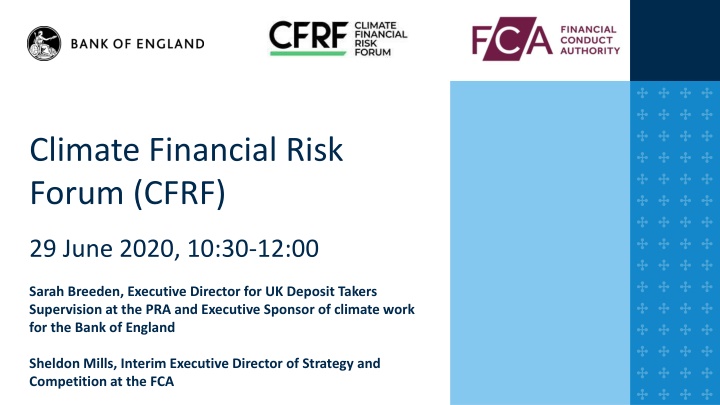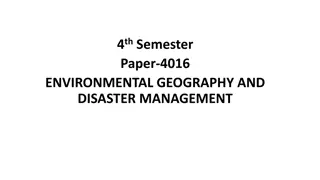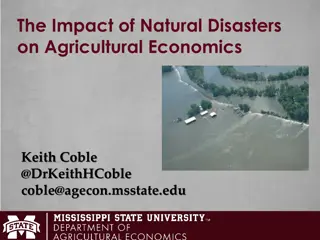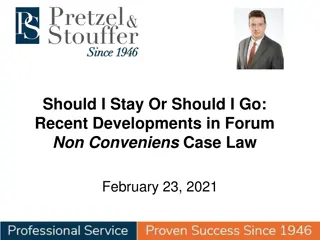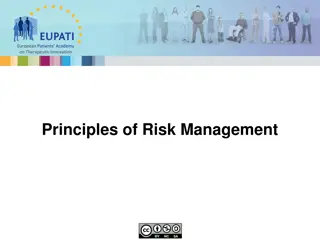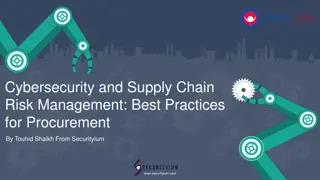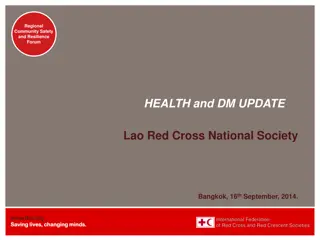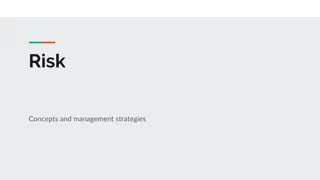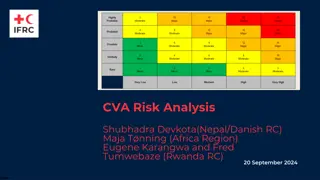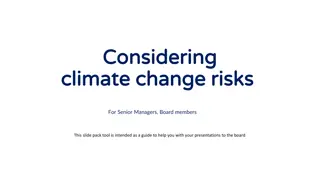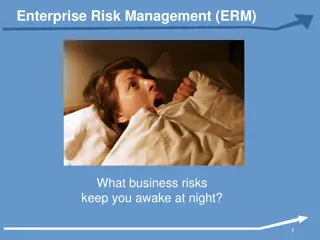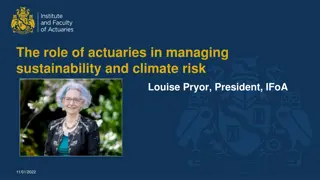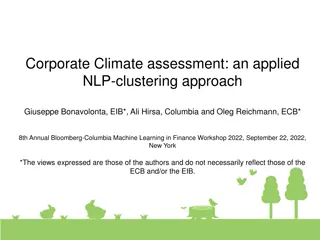Climate Financial Risk Forum: Strategies for Assessing Climate-Related Financial Risks
Practical guide from the Climate Financial Risk Forum on using scenario analysis to assess climate-related financial risks, featuring insights from industry leaders and case studies to inform business decisions and risk management strategies.
Download Presentation

Please find below an Image/Link to download the presentation.
The content on the website is provided AS IS for your information and personal use only. It may not be sold, licensed, or shared on other websites without obtaining consent from the author.If you encounter any issues during the download, it is possible that the publisher has removed the file from their server.
You are allowed to download the files provided on this website for personal or commercial use, subject to the condition that they are used lawfully. All files are the property of their respective owners.
The content on the website is provided AS IS for your information and personal use only. It may not be sold, licensed, or shared on other websites without obtaining consent from the author.
E N D
Presentation Transcript
Climate Financial Risk Forum (CFRF) 29 June 2020, 10:30-12:00 Sarah Breeden, Executive Director for UK Deposit Takers Supervision at the PRA and Executive Sponsor of climate work for the Bank of England Sheldon Mills, Interim Executive Director of Strategy and Competition at the FCA
Agenda: Time Item 10.30 10.35 Welcome from Sarah Breeden, Executive Director for UK Deposit Takers Supervision at the PRA and Executive Sponsor of climate work for the Bank of England 10.35 - 10.40 Welcome from Sheldon Mills, Interim Executive Director of Strategy and Competition at the FCA 10.40 10.45 Video from Andrew Bailey, Governor of the Bank of England and Chris Woolard, Interim CEO of the FCA 10.45 - 11.15 Panel discussion 11.15 - 11.50 Q&A session facilitated by Sarah Breeden and Sheldon Mills 11.50 12.00 Closing remarks from Sarah Breeden
Angela Darlington CEO UK Life Insurance Aviva Plc Angela is the CEO of UK Life Insurance, a position she has held since 24 April 2019. Angela is responsible for leading the UK Insurance business and is a member of the Aviva Leadership Team. Prior to her CEO role, Angela was the Group Chief Risk Officer for Aviva Plc, for 4 years. She was responsible for leading the Risk Function at a Group level and was a member of the Group Executive team. As part of her role, Angela chaired the Group Operational Risk Committee and was a member of a number of Aviva s subsidiary boards. Angela was also the 2019 Chair of the European Chief Risk Officer Forum. Since joining Aviva in 2001, Angela has also held a variety of actuarial roles including UK Life Chief Actuary and the UK Life Chief Risk Officer for three years. Angela began her career as an actuarial consultant for twelve years, working on a wide variety of actuarial assignments in many countries and qualified as an Actuary in 1994. Angela is a well-respected role model for LGBT and women in leadership, featuring in the OUTstanding Leading LGBT+ Executives List presented by the Financial Times. Angela is the Executive Sponsor of Aviva Pride in the UK and actively champions the importance of diversity and inclusion in organisations.
Scenario Analysis This chapter is a practical guide outlining leading practice and case studies on how to use scenario analysis to assess climate-related financial risks to inform firms strategy, risk management and business decisions. The expectations and practices around climate financial risk are quickly evolving so the information and examples in this chapter should be considered alongside current developments. Working Group members Aviva (Chair) GARP (Secretariat) ABI AIG BNP Paribas DWS HSBC JP Morgan PIMCO RSA Insurance Group Santander UK Standard Life Aberdeen UK Finance Investment Association The end to end climate scenario analysis process is iterative. end to end climate scenario analysis process is iterative. The results from identifying potential exposures should inform the scenario development process, which in turn should determine the key assumptions used in the assessment of the financial impact of that scenario. Insights gained from that financial impact analysis should in turn feedback into the refinement and identification of new risks and potential exposures and inform the on-going development of existing scenarios as well as supporting identification of potential new scenarios to be analysed. This cycle is illustrated by the figure on the top. Aviva: Confidential
Scenario Analysis The Working Group recognises there are many challenges and barriers to overcome in performing scenario analysis in particular the breadth and magnitude of the effects of climate change, the extended time horizons, uncertainty and lack of recent historic precedents. Breadth and magnitude of Breadth and magnitude of transition and physical risks transition and physical risks Climate change will affect all agents in the economy (households, businesses, governments), across all sectors and geographies. It is hard to know where to start and which effects to prioritise in analysis. The risks will likely be correlated and, potentially aggravated by tipping points, in a non-linear fashion. This means the impacts could be much larger, and more widespread and diverse than those of other structural changes. Extended and uncertain Extended and uncertain time horizons and feedback time horizons and feedback loops loops The time horizons over which climate-related financial risks may be realised are uncertain, and their full impact may crystallise beyond most current business planning horizons. Conversely, social tipping points are rarely modelled but may mean some transition elements affect certain sectors abruptly, using past data may not be a good predictor of future risks and currently there is often little economic incentive to take the short-term actions needed, and some major economic barriers. Weakness of many climate Weakness of many climate economic models economic models Many economic models of climate impacts are poor in higher warming scenarios, with simplistic damage functions that fail to reflect the compounding impacts of a cocktail of physical risks and social implications that are consistent with the science. Data GAPS and Data GAPS and comparability of comparability of disclosures disclosures Firms may need to use additional metrics requiring new data and new modelling methods to capture climate impacts on the economy and their business. Such variables might include hazard factors for physical events or green-house gas emissions from specific economic activities. Firms are likely to find that their existing risk models will also need to be adapted to capture climate factors. Cognitive bias must be recognised and accounted for when developing and using any type of scenario. For example, people unconsciously assess probability of a future event or outcome on the basis of how easily they can remember past examples or how easily they can imagine possible events. Cognitive bias Cognitive bias Aviva: Confidential
Dr Daniel Klier Group General Manager Chief of Staff of Global Banking & Markets and Global Head of Sustainable Finance. In his role as Global Head of Sustainable Finance, Daniel leads HSBC s bank- wide activities to become the leading bank in the transition to a low carbon, sustainable economy. HSBC was named The World s Best Bank for Sustainable Finance in 2019. Daniel joined HSBC in 2013 as Group Head of Strategy in London. Prior to joining HSBC, Daniel was a Partner at McKinsey & Company. He chairs the Sustainable Finance Working Group at the Institute of International Finance (IIF), served on the UK Government Green Finance Task Force, and is a member of the Board of Sustainable Energy for All. Daniel is a Young Global Leader at the World Economic Forum.
Building blocks of climate risk management Building Blocks Integrate climate risk into governance and risk management framework Risk Management Frameworks Risk Governance Risk Appetite Insurance Underwriting risk Credit risk Market risk Operational risk Conduct climate risk assessment Other related risks: Litigation risk, reputational risk, conduct risk, other risks Invest in necessary enablers Data and Tools Training and Culture Build consistent approach with scenario analysis and disclosure Scenario analysis (separate workstream) Disclosure (separate workstream) RESTRICTED 7
Climate risk management Lessons learned 1 It s all about integration 2 It starts with the tone from the top There isn t only one approach to climate risk management different business models face different risks 3 4 Lack of data is a challenge but not an excuse 5 Asking the right questions is half the answer RESTRICTED 8
Saker Nusseibeh International business of Federated Hermes Saker is Chief Executive of the international business of Federated Hermes and is also a member of the Federated Hermes Executive team. He was appointed CEO in November 2011 having joined the firm in June 2009 as CIO. Prior to this, Saker was Global Head of Equities at Fortis Investments, having initially been appointed to the firm as CIO Global Equities in 2005. Before this, he was CIO of Global Equities and Head of Marketing for SGAM UK. This role followed SGAM s acquisition of Trust Company of the West (TCW), where Saker was a Managing Director, running global and international strategies, as well as managing TCW s London office. He started his career at Mercury Asset Management in 1987. Saker is the founder of the 300 Club, a group of leading CIOs and investment professionals who seek to challenge investment orthodoxy. He was an inaugural member of the CFA Institute s Future of Finance Advisory Council from 2013 until 2019. He is a member of the IIRC Council, the International Finance Corporation, and the FCA-PRA Climate Financial Risk Forum, as well as the United Nations Environmental Programme Financial Initiative Steering Committee. He sits on the Banking Standards Board, which was created as a result of a Parliamentary enquiry to restore trust in the UK banking industry. Saker sits on UK National Advisory Board on Impact Investing and is also on the advisory Board of the National Youth Orchestra. In 2015, Saker was named CEO of the Year at the Global Investor Investment Excellence Awards and, in 2018, was named CEO of the Year at the Financial News Asset Management Europe Awards. He has a BA and PhD in Medieval History from King's College, University of London. Saker was awarded a CBE (Commander of the Order of the British Empire) in the Queen s 2019 New Year s Honours list for services to Responsible Business and Finance
Nigel Wilson Group Chief Executive, Legal & General Nigel joined L&G in 2009 as Group CFO, appointed Group CEO in 2012. He was awarded City AM s Business Personality of the Year , 2014. He also won Most Admired Leader , 2017. Nigel recently won Change Maker of the Year at the Change Makers Summit. Nigel was a member of the Prime Minister s Business Advisory Group (2015-2016), Chairman of the Investment Association s review of Executive Pay (2016-2017) and the government s review of Mission Led Business (2016- 2017). He was also a member of the government s Patient Capital Review Industry Panel (2017 2018) and Commissioner in Resolution Foundation s Intergenerational Commission (2017 2018). Nigel s advising on the government s Social Care Green Paper and Life Sciences Industrial Strategy Implementation Board and is Chair of the Bank of England s Climate Financial Risk Forum, Innovation Working Group.
